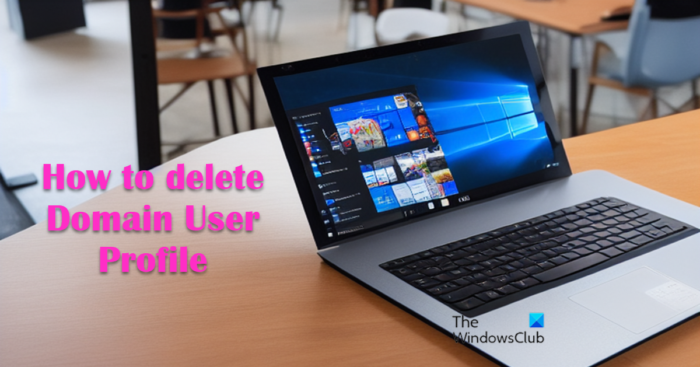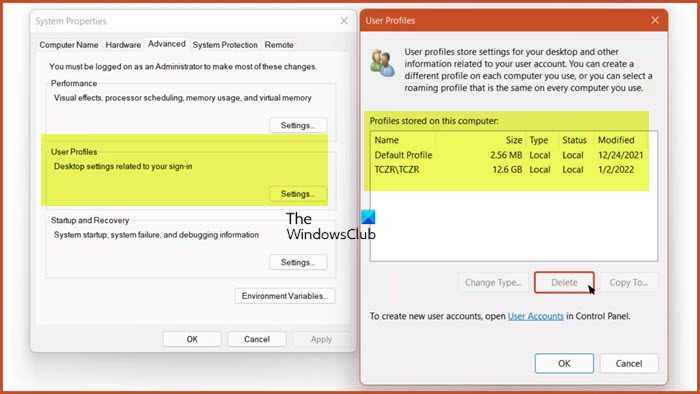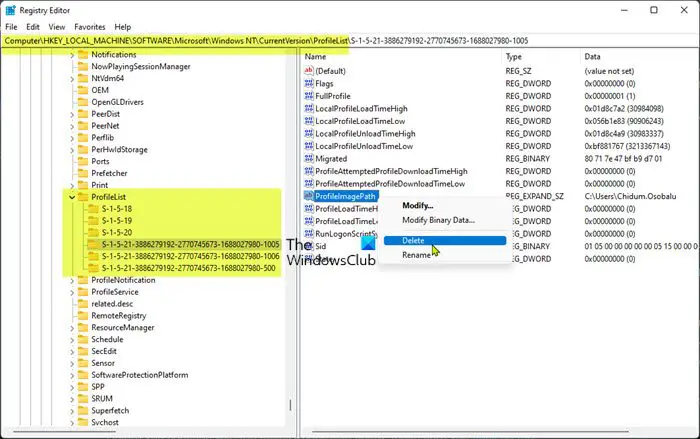If you’re looking for how you can remove a user and their files from a domain-joined PC without wiping the device, then you’re at the right place. In this post, we will show you how to easily delete a Domain User Profile in Windows 11/10.

How to delete Domain Profile in Windows 11/10
For one reason or the other, you may want to delete a domain user profile or account on a Windows 11/10 PC – for example, you may have a laptop that was used temporarily that you want to repurpose for another user by removing the old user profile and the associated user’s files (including email) to save space on the laptop before the new user logs in and their files begin downloading.
When a Windows machine is joined to a domain such as Active Directory, several Windows UIs relating to accounts are changed (e.g., netplwiz) since the Windows login experience changes once bound to a domain. When attempting to delete an account, there are three areas to address viz: user profile directory, user registry keys, and user credentials (for local accounts). So, to fully delete a domain profile on a Windows 11/10, you can use either of the methods below.
- Via User Profiles settings in System Properties
- Via File Explorer and Windows Registry
Let’s see the description of the process involved in both methods listed above. Make sure to log in as administrator (Domain or Local) on the computer you want to delete the account from before you proceed.
1] Via User Profiles settings in System Properties

This is a quicker method as both the user profile directory and the user Registry keys can be deleted in one easy step via the User Profiles settings in System Properties.
Do the following:
- Press the Windows key + R to invoke the Run dialog.
- In the Run dialog box, type sysdm.cpl and hit Enter to open System Properties.
- In the System Properties sheet, go to the Advanced tab.
- Under the User Profiles section, click the Settings button.
- In the User Profile menu, click to select the domain profile you want to delete.
- Click the Delete button.
Keep in mind that if the system is no longer connected to the domain, then you would not be able to log into that account after the deletion is done so make sure you have an admin account or domain connectivity to disjoin the laptop and/or create a new admin user.
Read: User Profile Service failed the logon, User profile cannot be loaded
2] Via File Explorer and Windows Registry

This method requires you to manually delete the folder for the user account/profile located in the C:\Users folder. Once done, you can proceed to make changes to the registry by deleting the user branch SID to clean up the last of the user profile.
Do the following:
- Press the Windows key + E to open File Explorer.
- In File Explorer, navigate to the directory path below:
C:\Users
- At the location, select or highlight the domain profile user account folder you want to delete.
- Now press the Shift + Delete key combo to bypass the recycle bin after deletion.
- Exit File Explorer.
Before you continue with the registry operation below, make sure you back up the registry or create a system restore point as necessary precautionary measures.
- Open Windows Terminal in administrator mode.
- In the PowerShell or Command Prompt console, type or copy and paste the command below and hit Enter:
wmic useraccount get name,sid
- From the output, make a note of the SID value for the domain account that you want to remove.
- Next, press the Windows key + R to invoke the Run dialog.
- In the Run dialog box, type regedit and hit Enter to open Registry Editor.
- Navigate or jump to the registry key path below:
HKEY_LOCAL_MACHINE\SOFTWARE\Microsoft\Windows NT\CurrentVersion\ProfileList
- At the location, on the left navigation pane, under the ProfileList sub-parent folder, click to select the folder displaying the exact SID value you identified earlier.
- Now, at the right-pane, right-click the ProfileImagePath key.
- Select Delete from the context menu.
- Exit Registry Editor.
- Restart computer.
The next time you log in to your account on the computer, a new default user profile will be created automatically, provided the domain account hasn’t been deleted on the domain itself.
Read: Profile not deleted completely, Error – The directory is not empty
That’s it!
These posts might interest you:
- Deleted User Profile by mistake and now can’t log in
- Delete old user profiles and files automatically in Windows 11/10
- How to recover deleted User account profile in Windows 11/10
- Remove old unused User Account Pictures in Windows 11/10
How do I delete a domain profile?
To delete a domain profile on a Windows 11/10 PC, follow these steps:
- Open Windows Settings.
- Search for Advanced System Settings and open “View Advanced System Settings”.
- Click Settings in the User Profiles section.
- Select the User Profile that you want to remove and click Delete. Deleting the profile can take some time. Be patient.
- Empty the Recycle Bin.
How do I remove a computer from a domain?
To remove a computer from a domain, follow these steps:
- Click System in the menu.
- Within the System menu, click Change Settings.
- On the Computer Name tab.
- Click Change.
- Choose Workgroup instead of Domain.
- Next, type the name of a new or existing work group.
- Click OK.
- Restart the computer for the changes to take effect.
How do I completely remove a user from Active Directory?
To delete an Active Directory domain user account, open the Active Directory Users and Computers MMC snap-in, right-click the user object, and select Delete from the context menu. Click Yes on the Are you sure you want to delete this object? prompt to confirm the deletion.
Read:
- Active Directory Users and Computers not responding
- Add User or Group button is grayed out in User Rights Assignment
Does Active Directory have a recycle bin?
The Active Directory Recycle Bin facilitates the recovery of deleted Active Directory objects without requiring restoration from backup, restarting Active Directory Domain Services, or rebooting domain controllers (DCs).
Leave a Reply